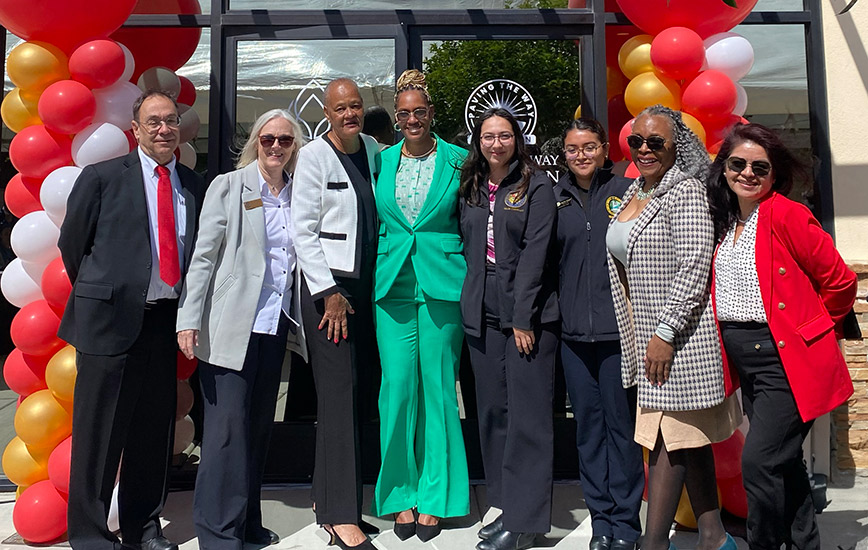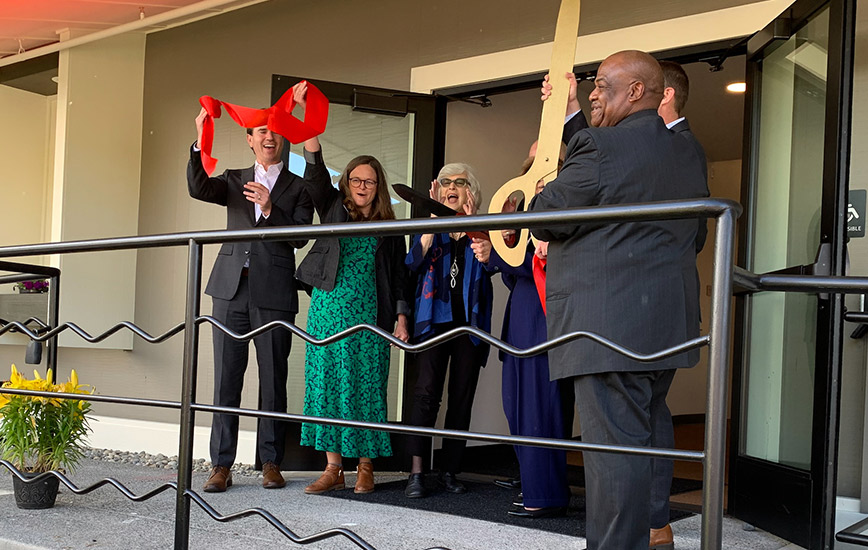DHCS CELEBRATES RIBBON CUTTINGS FOR CRISIS CARE CENTERS
Projects in Los Angeles and Sonoma Counties Received a Combined $15 million in Grants to Expand Behavioral Health Treatment and Recovery Options in Local Communities
SACRAMENTO — The Department of Health Care Services (DHCS) celebrated the addition of two new facilities that will provide lifesaving treatment for Californians with mental health and substance use disorders (SUD). This week saw two ribbon-cutting ceremonies that are bringing new prevention, treatment, and recovery facilities to Los Angeles and Sonoma counties, adding new capacity for much-needed drug and alcohol treatment programs, mental health wellness services, and recovery support. These are the first of many community treatment sites that are under construction now in
49 counties, and even more sites will be funded and built, thanks to recently approved Proposition 1 bonds, in 2025 and 2026.
“Californians want urgent action and real results when it comes to our state's behavioral health system, and that is exactly what we're seeing today," said
Governor Gavin Newsom. “Thanks to the support from Californians, a new infusion of funds will allow treatment centers like these to continue to open all over the state for the next few years. We have a lot of work ahead of us to make sure people can get the treatment, support, and care they need, but today marks yet another step forward toward a new system of accountability and results."
“In order to help Californians get the care they need when they need it most, California is investing to increase our crisis care capacity," said
DHCS Director Michelle Baass. “We hear time and again that the greatest barrier to mental health and SUD treatment is reaching individuals who need help. We are committed to meeting people where they are: in their homes, on the street, and in their communities. We envision a future where care comes to our communities and not the other way around."
Paving the Way Foundation in Los Angeles County and
Center Point Drug Abuse Alternatives Center in Sonoma County are expanding behavioral health treatment and recovery options in their local communities.
PAVING THE WAY FOUNDATION: 
Janie Hodge, third from left, founder and executive director of Paving the Way (PTW) Foundation, is joined by PTW COO Christina Lara, right of Janie, and representatives from city and state legislative offices.
Paving the Way Foundation held a ribbon-cutting ceremony on April 25 for a community wellness center in Los Angeles County. The center includes a comprehensive program of outpatient mental health services, including preventive services, screening, diagnosis, and treatment/management of mental health and SUDs. They serve adults with co-occurring mental health and substance use disorders (SUD), justice-involved individuals, and people experiencing or at risk of homelessness.
“This was my dream, my vision, when I returned home after my years of addiction almost 30 years ago – to provide a place of healing, care, and support for those society has neglected and forgotten," recalls
Janie Hodge, founder and executive director of Paving the Way Foundation, a nonprofit that supports Antelope Valley residents in reentry and recovery. “When I started Paving the Way nearly 20 years ago, I wanted to get our community trained in jobs that can sustain them and support their families, be able to give those who are coming home hope, knowing that there are people here in their corner to help them move through the steps of reintegrating into their communities and families," said Hodge, who also serves on the Steering Committee for the Los Angeles Regional Reentry Partnership, a countywide network of more than 500 reentry service providers and advocates.
CENTER POINT DRUG ABUSE ALTERNATIVES CENTER:

Maurice Lee, Chief Executive Officer of Center Point, Inc., holding scissors, leads Center Point
DAAC's ribbon cutting
Center Point Drug Abuse Alternatives Center (DAAC) celebrated a ribbon-cutting and dedication ceremony on April 26 of the Dr. Sushma D. Taylor Recovery Center, a groundbreaking new facility dedicated to the treatment and recovery of people struggling with SUDs. Unique in its offering, the center is the only 50-bed residential SUD treatment facility for low-/no income men in Sonoma County and the sole provider of medically supported withdrawal management services for Partnership HealthPlan of California members in Northern California.
"The Center Point Board of Directors and DAAC Board of Directors are thrilled to announce the ribbon-cutting and dedication ceremony of the Dr. Sushma D. Taylor Recovery Center to treat and help individuals recover from substance use disorders. The recovery center's opening signals a beacon of hope for individuals grappling with addiction. This center is now open because of BHCIP, a collaborative effort of state and community members that exemplifies the power of unity in addressing critical public health challenges," said
Maurice Lee, Chief Executive Officer of Center Point, Inc.
WHY THIS IS IMPORTANT:
Through the
Behavioral Health Continuum Infrastructure Program (BHCIP), DHCS helps build, buy, or rehabilitate buildings or invests in needed mobile crisis infrastructure to expand the range of community-based behavioral health treatment options for people with mental health and SUDs, who have been involved in the criminal justice system, and who are experiencing or at risk of homelessness.
BHCIP aims to address historic gaps in the behavioral health care system and meet the growing demand for services and support throughout the lifespans of people in need. DHCS was authorized through 2021 legislation to award $2.2 billion in BHCIP competitive grants. In addition, DHCS will distribute roughly $4 billion in BHCIP grants under Proposition 1 bond funds. Proposition 1 includes the Behavioral Health Services Act and Behavioral Health Infrastructure Bond Act of 2024. Behavioral Health Transformation (BHT) is DHCS' work to implement Proposition 1. DHCS will hold monthly
BHT public listening sessions. Updates and recordings of the sessions are available on the
BHT webpage.
ABOUT BHCIP ROUND 3 LAUNCH READY:
BHCIP Round 3 Launch Ready awarded grants to counties, cities, tribal entities, nonprofit organizations, for-profit organizations, and other private organizations, including private real estate developers, to expand community capacity for serving the behavioral health (mental health and SUD) population. Awardees must make a commitment to serve Medi-Cal members. For more information, please visit the
BHCIP website.